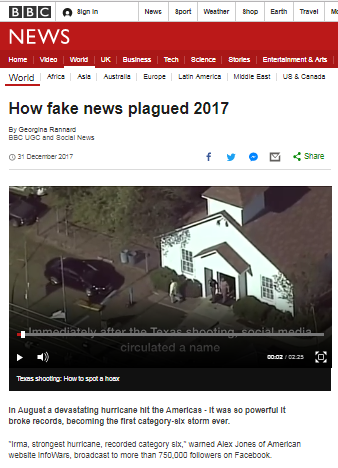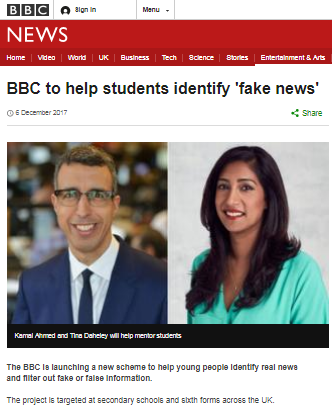Guest post from BBC Watch, originally published on their website
On December 31st the BBC News website published an article titled “How fake news plagued 2017” which provides readers with the following definition under the sub-heading “What is fake news?”.

- Completely false information, photos or videos purposefully created and spread to confuse or misinform
- Information, photos or videos manipulated to deceive – or old photographs shared as new
- Satire or parody which means no harm but can fool people
Other proposed definitions of the phenomenon are wider. As Claire Wardle of First Draft (which is partnered by BBC News) has noted, it can also include misinformation promoted by journalists.
Unsurprisingly, the BBC’s article about ‘fake news’ in 2017 does not include any of its own content – which would not fall under the definition it has chosen to promote.
However, BBC Watch has recorded numerous examples of misinformation promoted by the BBC throughout the past year. Among the inaccurate claims made by the BBC to which we have managed to secure corrections are the following:
1) The claim that most Gulf Arab countries “now accept the existence of the Jewish state”:
BBC partially corrects ‘The World Tonight’ inaccuracies
2) The claim that Jerusalem as a whole is “occupied”:
Following complaint, BBC Arabic corrects partisan terminology
3) The claim that nine people murdered in a terror attack in 2002 were “Jewish settlers”:
BBC Watch secures another correction to a BBC Arabic article
4) The claim that an attack in Syria was carried out by Israel:
BBC News website amends claim of Israeli strike in Syria
5) The claim that Tel Aviv is “the Israeli capital”:
BBC Watch prompts edit of BBC WS inaccurate location of Israel’s capital
6) The claim that Jews rioted in Manchester in the 1940s:
After nearly 3 months, BBC finally corrects Manchester inaccuracy
Error acknowledged, complaint upheld – yet BBC inaccuracy still remains online
7) The claim that Israel was “carved out of land which had belonged to the Palestinians”:
BBC WS acknowledges inaccurate claim in history show
8) The claim that Mt Scopus and the Hebrew University are “Israeli settlements”:
BBC Watch prompts amendment to inaccurate BBC map
9) The claim that the Battle of Beersheba “led to” the Balfour Declaration:
Inaccurate BBC Balfour Declaration claim misleads audiences
10) The claim that “most Jewish organisations” rejected the 1947 Partition Plan:
BBC Watch complaint on Partition Plan inaccuracy upheld
11) The claim that a convicted soldier held the rank of sergeant:
BBC News website twice reports convicted soldier’s rank inaccurately
12) The claim that attacks on Israeli communities were carried out using “mortars”:
Correction secured to inaccurate BBC News website claim about Gaza attacks
The BBC’s narrow definition of ‘fake news’ is of particular interest given that just last month the corporation announced that it was “launching a new scheme to help young people identify real news and filter out fake or false information”.
“James Harding, the director of BBC News, said: “This is an attempt to go into schools to speak to young people and give them the equipment they need to distinguish between what’s true and what’s false.” […]
“I think that people are getting the news all over the place – there’s more information than ever before,” said Harding.
“But, as we know, some of it is old news, some of it is half truths. Some of it is just downright lies. And it’s harder than ever when you look at those information feeds to discern what’s true and what’s not.”
Given the above examples (as well as countless others) of misinformation promoted by the BBC – along with its notoriously slow complaints procedure and inadequate corrections mechanism which does not even include a dedicated corrections page on the BBC News website – one might well conclude that the physician first needs to heal himself.
BBC Watch would like to thank all the many readers who contacted us during 2017 to bring problematic BBC content to our attention. Please continue to write in – your tips are an invaluable contribution to our work of identifying content that breaches BBC editorial guidelines and trying to secure corrections to claims that mislead and misinform BBC audiences in a manner no less pernicious than the type of ‘fake news’ that the BBC does recognise.


